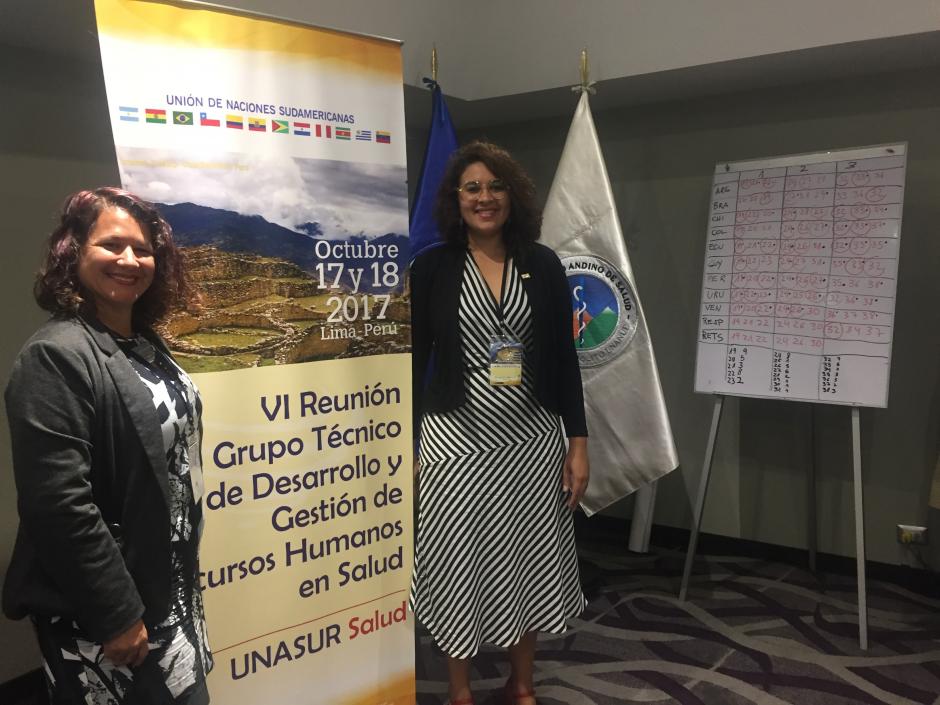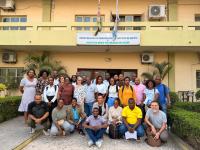RETS takes part in UNASUR meeting on HR management

Representatives from the Executive Secretariat of the International Network for Health Technicians Education (RETS, from Rede Internacional de Educação de Técnicos em Saúde), which is located at Joaquim Venâncio Polytechnic Health School (EPSJV/FIOCRUZ, from Portuguese Escola Politécnica de Saúde Joaquim Venâncio), took part in the VI Meeting of the Union of South American Nation’s (UNASUR) Technical Group for the Development and Management of Human Resources for Health (GTRHUS) on October 17th and 18th. The meeting took place in Lima, Peru, and had the goal of establishing the guidelines for UNASUR’s Human Resources (HR) for Health Policy, which will guide the development and strengthening of the HR management among its member states. Promoted by the GT, the event was attended by representatives from the ministries of Health of Brazil, Argentina, Colombia, Chile, Ecuador, Guyana, Peru, Uruguay and Venezuela, as well as delegations from the South American Network of Public Health Schools (RESP/UNASUR) (RESP-UNASUR), the South American Institute of Government in Health (ISAGS), and the Pan American Health Organization (PAHO/WHO).
During the round table entitled ‘ ‘Advances of the Commitments Made During the III Global Forum on Human Resources for Health’, Anakeila Stauffer, EPSJV director, made a presentation about the RETS-USAN, indicating the efforts made towards the fulfillment of the commitments made by the GTRHUS, with the support of the RETS, during the III Global Forum on Human Resources for Health, held in the city of Recife, Brazil, in 2013. She also highlighted the difficulties faced in order to finish mapping the training of healthcare technicians in UNASUR’s member states, which was a crucial part of the commitment made, and the plans to continue with the project.
‘Among the activities performed throughout the nine years of existence of the RETS-UNASUR, it is important to highlight the effort of the RETS to develop teaching proposals, research projects, and online seminars. However, it is still necessary to confer visibility to the work agendas that include the category of the healthcare technicians and to strengthen the political alliances with the goal of guaranteeing the network’s https://www.cialissansordonnancefr24.com/generique-cialis/ role of political coordination and to broaden its funding capabilities,’ highlighted Anakeila.
In the meeting, the critical and pressing deadlocks for the development of the group’s work plan were identified during the debate about the document entitled ‘The Human Resource Strategy for Global Access to Healthcare and Global Healthcare Coverage’. ‘At that moment, the member states indicated, among their priorities, the issue of expanding their knowledge of the work of the healthcare technicians, namely the ones that work on Primary Healthcare (PH),’ emphasized Ingrid D’Avilla, an EPSJV researcher. She added that ‘the member states expect to expand their knowledge of the work of these technicians so that their actual work competences and their need for training may be identified, already making the diagnosis that in some countries, these technicians play a crucial role in PH due to the absence of other professionals and teams.’
‘The current context is one in which there is a set of objections in every country, resulting in a difficulty in implementing the public policies. During the debates, some issues regarding the work of the healthcare technicians were highlighted, such as: employee turnover, the need to validate academic titles within the USAN, and the need to coordinate the training of the region’s professionals so that they can fulfill the PH needs and can properly respond to the characteristics of each territory,’ emphasized Ingrid.
On October 20th, EPSJV participated in a meeting with Claudia Ugarte, coordinator of the GT, and Pedro Diaz, a representative from Peru’s Ministry of Health, to evaluate the history of bilateral cooperation between EPSJV and Peru’s National Health Institute. ‘They contextualized the current situation of some public policies and stated that it would be possible to develop a cooperation project for the training of technicians who work in the field of vigilance health in Northern Peru, with an emphasis on arboviruses,’ stated Ingrid.
Developments
As one of the developments of the meeting, EPSJV and ISAGS presented a proposal for training in teaching and for the development of a mapping/situation analysis of the healthcare technicians of the twelve UNASUR member states. ‘We intend to develop this project through RETS, and it will be submitted by Brazil, Peru, Colombia, ISAGS and by UNASUR’s GTRHUS to UNASUR’s Common Initiative Fund (FIC), which provides funding for the social initiatives of the member states. We managed to present the initial draft of the project and get some feedback,’ highlighted Ingrid.



